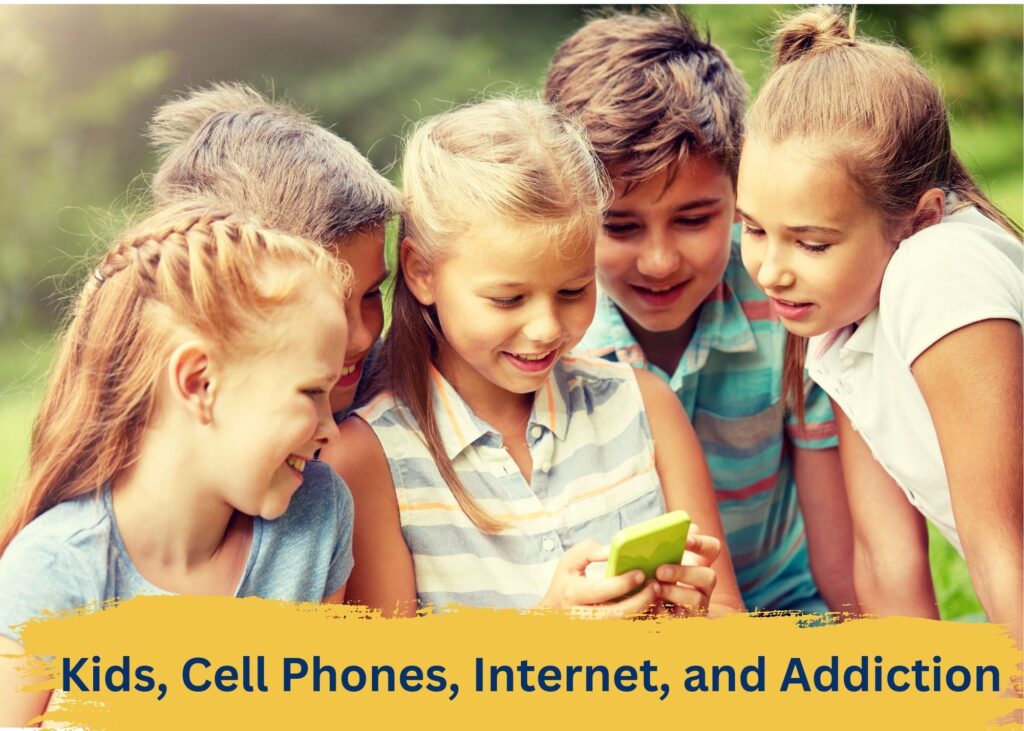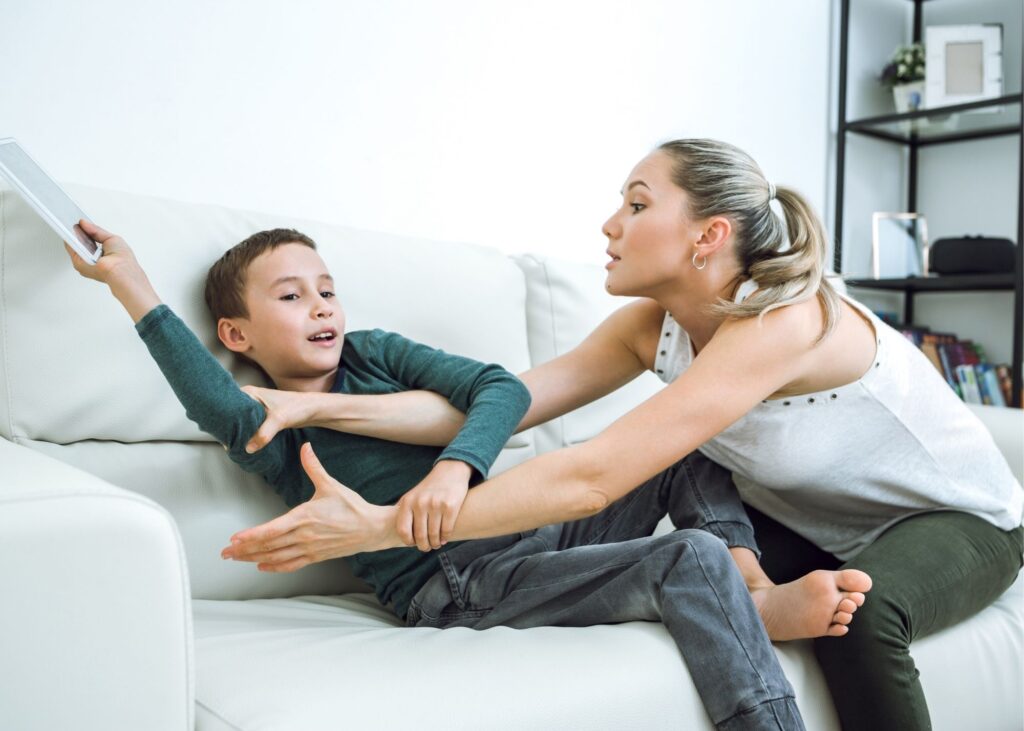Kids, Cell Phones, Internet, and Addiction
 Scientists focus more on the way cell phones and internet technologies affect teens. But there’s a justifiable necessity to shift one’s attention to young children. Still, the difficulty lies in the fact that it’s unethical to put young kids at risk just to measure the negative effect of frequent phone use. Thus, the number of studies devoted to such questions is much smaller compared to those focused on teens.
Scientists focus more on the way cell phones and internet technologies affect teens. But there’s a justifiable necessity to shift one’s attention to young children. Still, the difficulty lies in the fact that it’s unethical to put young kids at risk just to measure the negative effect of frequent phone use. Thus, the number of studies devoted to such questions is much smaller compared to those focused on teens.
But there’s no doubt cell phones and the internet can be a source of danger for preschoolers. So, how to benefit from modern technologies and save your kids` health? Here are the answers.
How to Stop Phone Addiction?
NPR reported the results of the Common Sense Media study. It turned out that just over half of children up to 11 have their own cell phones.
No wonder, more and more kids spend hours playing with their smartphones rather than spending time outdoors. According to Pew Research Center, more than 50% of polled teens recognize they devote too much time to their smartphones. What to say about infants who cannot think self-critically?
Common wisdom says kids cannot do without smartphones nowadays. And that’s also true. It’s high time to answer how phone use can hurt your kids and what to do to use it for their good.
What Are the Symptoms of Cell Phone Addiction?
The article in Frontiers in Psychiatry sums up the phone addiction symptoms. These are:
- Indifference to other activities;
- Use of cell phone in prohibited or inappropriate context (when crossing a street, taking the subway, etc);
- Preferring a smartphone to live communication;
- Irritability when being banned from cell phone use;
- Checking a phone every few minutes;
- Increase in phone use just to boost mood or prevent ill humor;
- The feeling of anxiety if a phone is not accessible;
- Throwing temper tantrums when taking a phone from a child;
- Feeling confused and lost when a cell phone is out of order, etc.
If you notice some of these symptoms of cell phone addiction in your kids, you’d better take it under control. The same symptoms are common for adults as well. Do you have any of them? Get rid of it if you want to be a positive role model for your little one. Doing a Phoneless challenge with your kids would a great start.
5 Reasons Your Kid Should Have a Cell Phone
Despite all the disadvantages, one cannot state that cell phones and the internet are completely dangerous to kids. Just think about these pluses.
- A child is often in touch so that parents can reach him when needed. They can call mom or dad to fix an emergency issue immediately. Parents can track their location with the help of special apps. Kids can be monitored by their parents at any point.
- Children can learn digital literacy. One cannot neglect internet technologies in the modern world. That’s why infants should know the basis of smartphone and internet use. Plus, it can be helpful in their education process, especially during the pandemic. By the way, according to Pew Research Center, 59% of U.S. families with low incomes believe their children are likely to have difficulties catching up with their peers in terms of digitalization because of the lack of gadgets available for them.
- Social interaction is hugely dependent on phones. Smartphones are a source of talking points as well. Children discuss apps and YouTube trends. If kids fails to get new information, they may be left outside.
- The Internet can be useful. Cartoons, TikTok videos, and other similar stuff have no educational value. But what if it’s games or apps that develop speaking and writing skills or boost concentration and develop memory? Meanwhile, the researchers from FIU found that educational apps targeting math skills, letter knowledge, and vocabulary can be beneficial to kids under the age of 6.
- A kid can get to know about an area of knowledge he’s never heard of before. Take, for example, skiing. It may be a fantastic discovery for a little one living in Florida. Or, perhaps, your kid will hear the violin for the first time and would like to learn how to play it. Parents cannot even suspect what can grasp their kid`s interest. This way, the internet is a ticket to every corner of knowledge.

What Are the Negative Effects of Cell Phones?
All parents can name at least a few disadvantages of smartphones. The most common are the following ones:
- Bad quality of sleep. Kids may surf the net while in their beds. That negatively affects their sleeping time. For that matter, Sleep Foundation advises not to use smartphones for at least 30 minutes before sleeping.
- Poor mental health. Kids can face cyberbullying or just develop a habit of comparing themselves with other peers. According to the British Psychological Society kids who spend many hours looking at screens are supposed to have low self-esteem and suffer from depression and anxiety. In the worst cases, children commit suicide like David, the boy from this heartbreaking story.
- Blue light is harmful. It restrains the production of the hormone responsible for the sleeping cycle functioning. Plus, researchers say it can damage retinas.
- Reduced alertness. Kids who don’t sleep enough are more tired and less efficient the next day. Also they lack attention.
- Learning Difficulties. The internet and online games distract kids from learning, taking their time and energy. Also, smartphones emit non-ionizing microwave radiation. Interestingly, it has reduced the number of brain cells in rabbits and rats being exposed to radiation prenatally during a scientific experiment. At the same time, Swiss and French scientists say kids` bone marrow absorbs dozens of times more radiation than adults` born marrow. Subsequently, gadgets cannot but negatively affect children’s mental development.
- Addiction. Infants become addicted to their smartphones and refuse to leave them throwing temper tantrums. Besides, some of them cannot calm down until they receive the phone back again.
What Is an Appropriate Age for a Cell Phone?
The American Academy of Pediatrics insists on the following rules.
- 0-18 months. Kids can’t use smartphones under any circumstances.
- 18-24 months. Moms and dads should offer only high-quality programming and let their little ones interact with it only under their supervision.
- 24 months and older. Screen time should not be longer than 1 hour. Parents have to choose only educational content avoiding any traits of violence. Also, they ought to spend time together with kids while watching.
By the way, the WHO warns infants between 2 and 4 years old are only allowed to have an hour of screen time a day.
How to Not Be Addicted to Your Phone?
First of all, you have to be an example. Before banning your kids from cell phones, make sure you are providing a positive example.
- Talk about it. Explain to kids the negative effects of cell phones and the internet. Give them examples.
- Come up with the rules. Make clear boundaries for the whole family like no smartphones while having dinner. Also, impose penalties for the rules violation. It can prevent your kids from texting addictions and surfing the net. Start with your self and with personal example help your make a decision to limit time using gadgets.
- Phone Hunting. Create a ritual of getting rid of all tablets, laptops, and smartphones when going to bed. Make a place to collect them all for nighttime.
- Give an alternative. It’s unfair to deprive children of phones and give them nothing instead. Make sure they have enough options to spend their leisure time. Take, for example, fall activities.
What to Do If I Cannot Cope with My Kid`s Phone Addiction?
- Look for phone addiction help such as cognitive therapy. Child psychologists can change problematic behavior.
- Practice mindfulness activities to stop meltdowns. It includes yoga exercises and breathing activities.
- Try individual therapy to find the reasons for such addiction and the ways of dealing with it.
Conclusion
A basic phone for kids can bring them lots of benefits as well as cause harm to their mental health. In such a way, parents have to control their children’s screen time and adjust it to their needs. Don`t forget to give way to other more healthy activities instead of sticking to a display.
More articles

The Best SEL Picture Books for Kids: Top Social Emotional Learning Books for Every Classroom
Social-Emotional Learning (SEL) is most powerful when children can see feelings, empathy, and real-world challenges represented in stories. Using SEL picture books during read-aloud time is one of the most effective ways to nurture emotional intelligence, communication skills, and self-awareness in young learners. Whether you’re a teacher, parent, or school counselor, choosing the right social […]

SEL Lessons for Elementary Students (Free Guide)
Social-Emotional Learning (SEL) has become an essential part of supporting the whole child in today’s classrooms. High-quality SEL lessons for elementary students help young learners build confidence, manage emotions, strengthen relationships, and develop empathy. Whether you’re a teacher, counselor, or homeschooling parent, finding practical and free SEL lessons for elementary grades can be a challenge. […]

50+ Christmas Riddles for Kids (With Answers!)
Fun, Easy & Printable Holiday Brain Teasers Are you looking for Christmas riddles for kids that are fun, silly, and totally holiday-approved? You’re in the right place!This collection includes funny Christmas riddles for kids, classic Christmas brain teasers, and a big list of Christmas riddles for kids with answers—perfect for teachers, parents, and holiday party […]



